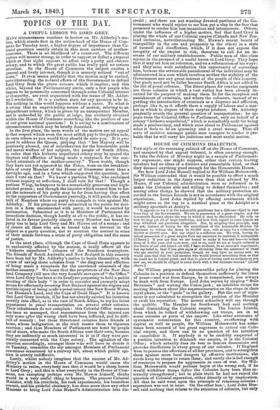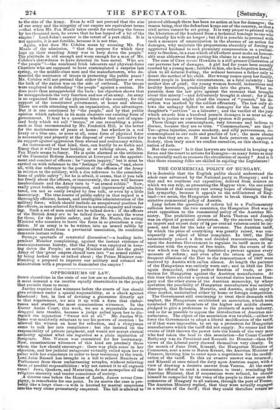HOUSE OF COMMONS DIALECTICS.
THE style of the reasoning palmed off on the House of Commons, and accepted by that august tribunal, is often amusing enough. To take the debate of Monday night as a sample of Parliament- ary argument, one might suppose, either that certain leading speakers had no ideas of a distinct and presentable kind, or that they deemed anything good enough for the Honourable House. See how Lord John Russell replied to Sir William Molesworth. Sir William contended that it would be possible to effect a much larger reduction in the Army even than that advised by Mr. Hume, if our Colonial administration were so reformed as to make the Colonies able and willing to defend themselves ; and among other things he showed that the military protection ac- corded to the Ionian Islands is not in accordance with the original stipulation. Lord John replied by effusing sentiments which might serve as the tag to a nautical piece at the Adelphi or a military spectacle at Astley's. "It appears to me teat the honourable gentleman has a different object in view from that of the Government. We are in possession of a great empire, and the- honourable Baronet shows the way in which it may be diminished. He tells us how we may get rid of large territories, and how with regard to some islands we may withdraw our garrisons altogether. But, by adopting that principle, may we not, instead of voting for the amendment of the honourable Member for Montrose to reduce the Army to 89,000 men, vote at once for a reduction to 49,000 or 39,000 men. But our object is a different one. We wish, having ob- tained possession of a great empire from our ancestors, to maintain it unimpaired. (Cheers.) If you say that we are bound to make it less and less—to reduce some of it this year, and more next, and so on, until we are at length reduced to the limits of our own island—it will, I have no doubt, be an economic experiment; but my belief is, that if you give signs of shrinking from the assistance of those who are entitled to your protection, though we may have no enemy now, we would soon find that we had enemies who would demand something from us that we could not in honour grant; and that in place of having such an.estimate as you now see, we should be obliged to come down with a war estimate instead." (Loud cheers.) Sir William propounds a statesmanlike policy for placing the Colonies in a position to defend themselves sufficiently for times of peace—and war from Europe, be it remembered, can always be dealt with from Europe. Lord John replies by singing " Rule Britannia" and waving the Union jack ; an infallible recipe for making Members cheer like supernumeraries on the stage in their loyal phase, or the "gods" in the gallery. But the sort of argu- ment is not calculated to strengthen the position of the Minister or exalt his reputation. The merest schoolboy will see through the quibble. The Member for Southwark had said nothing about diminishing the Colonial empire. The Ionian Islands, from which he talked of withdrawing our troops, are in no sense colonies or parts of the empire. Like other advocates of systematic colonization for this country, overflowing with capital as well as people, Sir William Molesworth has some- times been accused of too great eagerness to extend our. Colo- nial empire, and there can be no question of his intention to consolidate it. If anybody is to be credibly suspected of a positive intention to diminish our empire, it is the Colonial Office; which actually does its best to foment dissensions and provoke disaffection in every group of our colonies. If England were to possess the affections of either peovinces, and to strengthen them against mere local dangers by effective institutions, she needs keep no troopis to retain them; and surely she is full enough of resources to prepare for aggression in case of war. Sir Wil- liam Molesworth would perhaps begin at the wrong end, if he would withdraw troops before the Colonies have been thus in- ternally strengthened ; but in plain truth he had not raised the question of Colonial separation, either directly or by implication. All that he said went upon the principle of retaining colonies : separation was not in issue. On the other han.f, Lord John Rus- sell said nothing that relates to the retention of colonies, but only
to the size of the Army. Even he will not pretend that the size of our army and the integrity of our empire are equivalent terms —that when Mr. Fox Maule takes credit for reducing the forces by ten thousand men, he avows that he has lopped off a bit of the empire ? Lord John's answer is the retort of a pert child. It is not apposite, it is not forcible, because it is not true. Again, what does Mr. Cobden mean by accusing Mr. Fox Maule of the admission, " that the purpose for which they kept up their standing Army was to keep down the people." The platitude is old enough and worn enough for a man of Mr. Cobden's shrewdness to have detected its base metal. Who are " the people"?—the combined Irish labourers and physical-force Chartists who are supposed to have contemplated a surprise last spring, or the middle-class men and the manufacturers, who de- manded the assistance of troops in protecting the public peace ? Mr. Cobden will not pretend that either the intelligence or even the bulk of the nation was on the side of outbreak. The troops were employed in defending " the people" against a section. He does more than misapprehend the facts : his objection shows that he misapprehends the very function and use of an army. An army is an organized form of the physical force of the country, for the support of the constituted government, at home and abroad. There are evils attending such an organization, also advantages. But it is one sanctioned by "the people," and by that public opinion which upholds in its main elements our existing form of government. It may be a question whether that sort of organ- ized body which we call "troops," or one resembling a police such as that recommended by Mr. Frederick Hill, is the better for the maintenance of peace at home; but whether in a red livery or a blue one, or none at all, some form of physical force is necessarily and properly at the disposal of every Executive for its support against aggression from abroad and contumacy within. An instrument of that kind, then, can hardly be so feeble and flimsy that it will not bear looking at or talking about, as Mr. Fox Maule seems to fancy. He is quite alarmed at the criticism of the Financial Reform Association at Liverpool on the appoint- ment and conduct of officers : he "courts inquiry," but it must be carried on with reference to the "feelings" of others, "and, above all, with due reference to the position of the officers of the Army in relation to the soldiery, with a due reference to the considera- tions of public safety "; for he is afraid, it seems, that if you talk too freely about the officers, or inaccurately, the men will become insubordinate and the Army turn to "an armed rabble." Now, really great bodies, stoutly organized, and ingenuously adminis- tered, are not so easily swayed by free talk, or even by a little inaccuracy. The true source of public safety in that regard is a thoroughly efficient, honest, and intelligible administration of the military force; which should include an unequivocal position for the officers, as men selected for fitness in natural capacity and train- ing. Such a Bet of men could not be talked down : if the officers of the British Army are to be talked down, so much the worse for them, for the public safety, and for Mr. Maule, the acting Minister who consents to leave the force in so precarious a con- dition. If an army is to be written into an armed rabble by unconsidered tracts from a provincial association, its condition demands instant reform.
Strange spectacle of senatorial discussion !—a leading inde- pendent Member complaining, against the instant evidence of contemporaneous history, that the Army was employed in keep- ing down the People; an acting. Minister afraid lest the great Army of this'great empire should turn into "an armed rabble" by being looked into or talked about ; the Prime Minister con- founding a proposal to improve our military and colonial ad- ministration with a proposal to dismember the empire



























 Previous page
Previous page